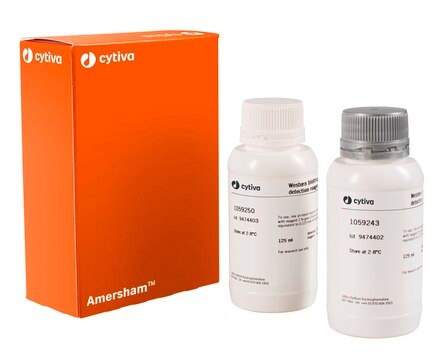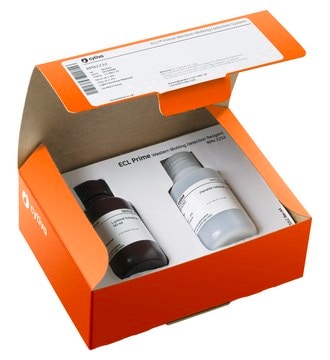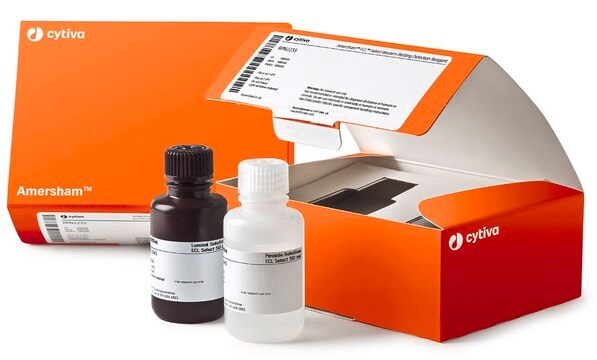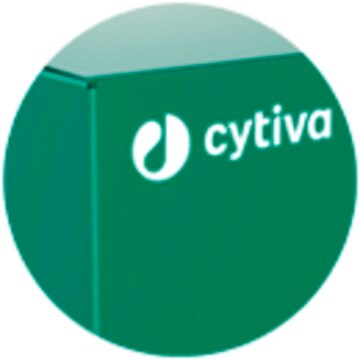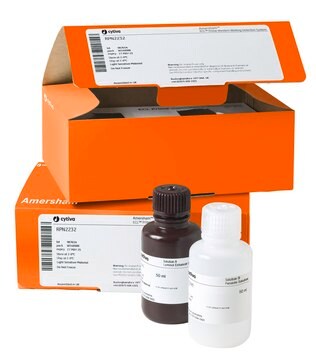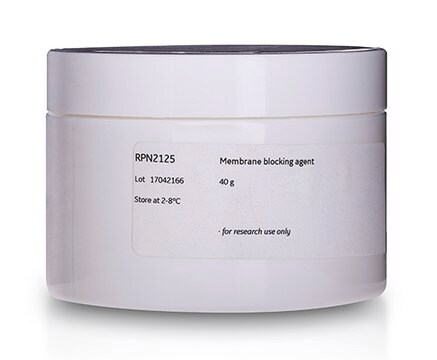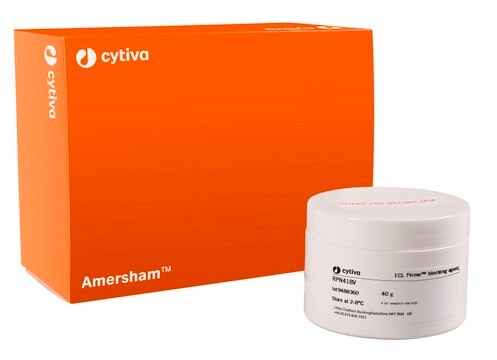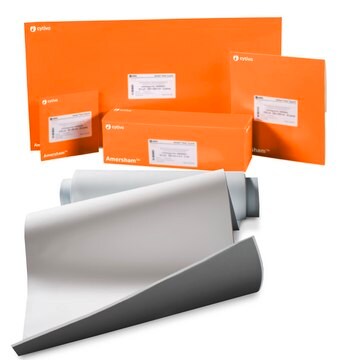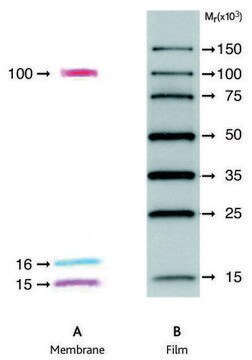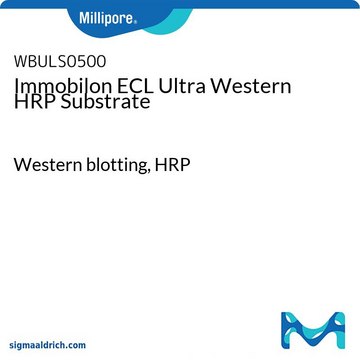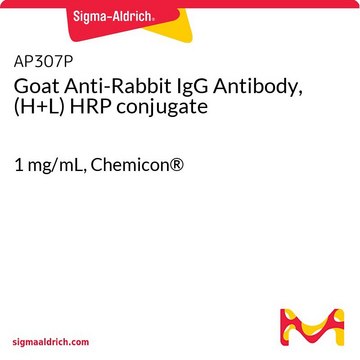GERPN2108
ECL™ Western Blotting Analysis System
Cytiva RPN2108
Zaloguj sięWyświetlanie cen organizacyjnych i kontraktowych
About This Item
Kod UNSPSC:
41105332
NACRES:
NA.32
Polecane produkty
opis
Detection reagent 1: Colorless Detection reagent 2: Colorless Peroxidase labelled anti-mouse antibody: Colorless Peroxidase labelled anti-rabbit antibody: Colorless Blocking agent: White
Właściwości
wetted part: no
opakowanie
pkg of 1 kit
producent / nazwa handlowa
Cytiva RPN2108
temp. przechowywania
2-8°C
Opis ogólny
ECL™ Western Blotting System is the world′s most widely used and referenced chemiluminescent immunodetection system.
ECL™ Western Blotting System uses horseradish peroxidase (HRP) conjugated anti-mouse and anti-rabbit antibodies for luminol-based detection of Western blots. Blots probed with mouse or rabbit primary antibodies are incubated with HRP-conjugated secondary antibodies. Addition of ECL™ Detection Reagents results in a chemiluminescent signal that can be captured on film or detected with a CCD camera.
Each system contains the following reagents, sufficient for detection of 1000 cm2 membrane:
Anti-mouse HRP conjugate, 100 μl
Anti-rabbit HRP conjugate, 100 μl
ECL™ Detection Reagents 1 and 2, 62.5 mL each
Blocking agent, 5 g.
ECL™ Western Blotting System uses horseradish peroxidase (HRP) conjugated anti-mouse and anti-rabbit antibodies for luminol-based detection of Western blots. Blots probed with mouse or rabbit primary antibodies are incubated with HRP-conjugated secondary antibodies. Addition of ECL™ Detection Reagents results in a chemiluminescent signal that can be captured on film or detected with a CCD camera.
Each system contains the following reagents, sufficient for detection of 1000 cm2 membrane:
Anti-mouse HRP conjugate, 100 μl
Anti-rabbit HRP conjugate, 100 μl
ECL™ Detection Reagents 1 and 2, 62.5 mL each
Blocking agent, 5 g.
Zastosowanie
ECL™ Blotting Analysis System has been used in western blotting.
Western Blotting
Cechy i korzyści
- Detection of mouse and rabbit primary antibodies on western blots using HRP-conjugated secondary antibodies and ECL™ reagents.
- Optimized system provides rapid, sensitive results using simple protocols.
- Designed for use with nitrocellulose and PVDF membranes.
- High sensitivity: Up to 10 times more sensitive than colorimetric methods.
- Rapid: Results can be rapidly obtained on X-ray film, providing hard copy data and avoiding fading associated with colorimetric detection methods.
- Easy reprobing: Save time and materials by reprobing on membranes up to 10 times.
- Quantifiable: Linear response in the range 0.2 to 2 OD units using pre-flashed Hyperfilm ECL,
- Non-radioactive-no specialized facilities needed
- Proven performance-the most widely referenced chemiluminescent detection method with hundreds of publications worldwide
Przechowywanie i stabilność
Please be aware this product may be shipped 90 days before the expiration date. For more information on the batch specific expiration date, please contact technical service.
Komentarz do analizy
To view the Certificate of Analysis for this product, please visit www.cytiva.com.
Informacje prawne
ECL is a trademark of Cytiva
Ta strona może zawierać tekst przetłumaczony maszynowo.
Hasło ostrzegawcze
Warning
Zwroty wskazujące rodzaj zagrożenia
Zwroty wskazujące środki ostrożności
Kod klasy składowania
12 - Non Combustible Liquids
Wybierz jedną z najnowszych wersji:
Certyfikaty analizy (CoA)
Lot/Batch Number
Przepraszamy, ale COA dla tego produktu nie jest aktualnie dostępny online.
Proszę o kontakt, jeśli potrzebna jest pomoc Obsługa Klienta
Masz już ten produkt?
Dokumenty związane z niedawno zakupionymi produktami zostały zamieszczone w Bibliotece dokumentów.
Klienci oglądali również te produkty
Marie-Theres Zeuner et al.
Biochimica et biophysica acta, 1863(12), 3084-3095 (2016-11-05)
A distinct feature of the Toll-like receptor 4 (TLR4) is its ability to trigger both MyD88-dependent and MyD88-independent signalling, culminating in activation of pro-inflammatory NF-κB and/or the antiviral IRF3. Although TLR4 agonists (lipopolysaccharides; LPSs) derived from different bacterial species have
Nasz zespół naukowców ma doświadczenie we wszystkich obszarach badań, w tym w naukach przyrodniczych, materiałoznawstwie, syntezie chemicznej, chromatografii, analityce i wielu innych dziedzinach.
Skontaktuj się z zespołem ds. pomocy technicznej